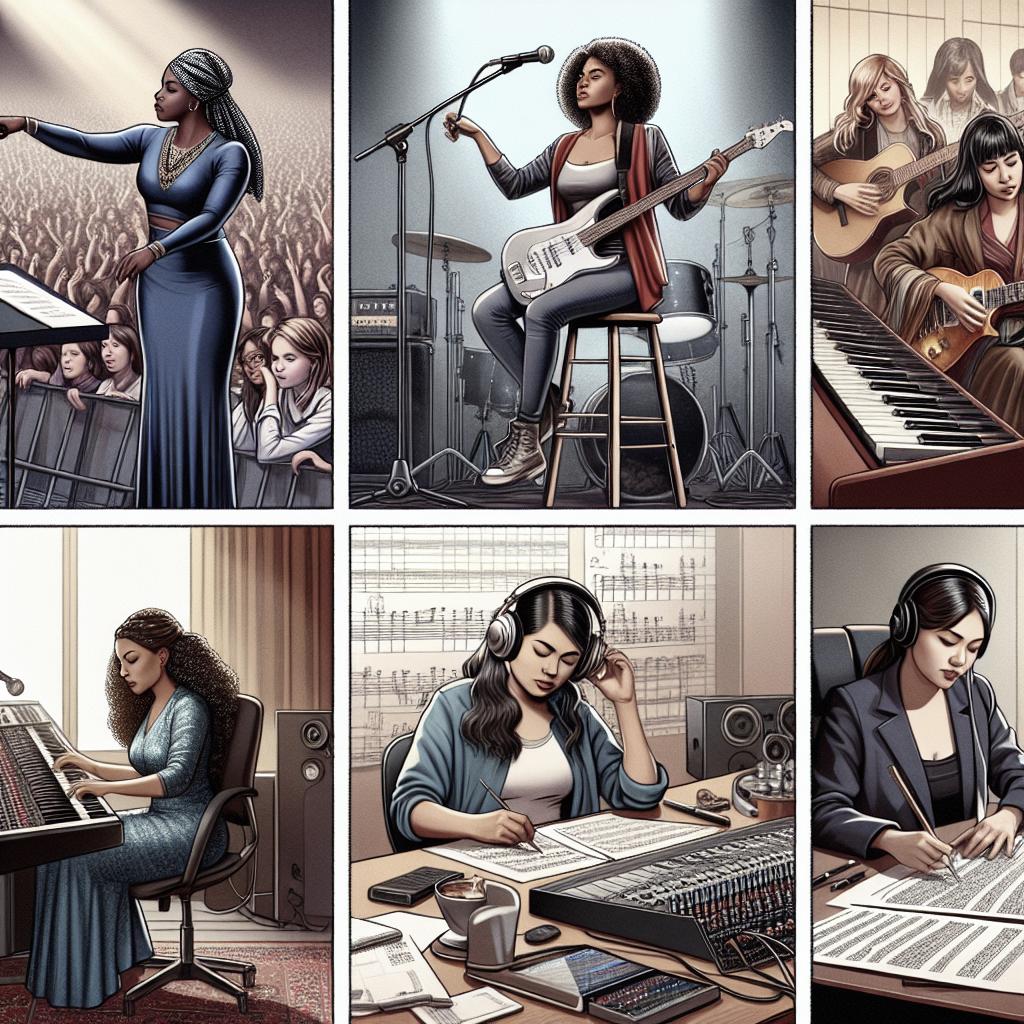“`html
Roles of Women in the Music Industry
The music industry has long been enriched by the immense talents and pioneering spirit of women. From historical beginnings to the present day, women have contributed in myriad ways, shaping the soundscape of our culture. This blog post explores the timeline of women’s involvement in music, spotlighting influential figures and movements across decades. We will examine whether the industry leans towards female dominance, unravel the challenges women face, and discuss potential strategies for creating more opportunities for women. Finally, explore the vibrant sphere of music creation for your projects. This comprehensive look at women in music not only highlights past achievements but also envisions future pathways for greater inclusion and recognition.
A Timeline of Women in Music History
Women have been a part of musical expression for centuries, though often overshadowed by their male counterparts. In the late 19th and early 20th centuries, women began to step into the limelight more prominently. Artists like Clara Schumann broke barriers in classical music, proving that women could be both virtuosic performers and profound composers.
The early 20th century saw the rise of women in jazz and blues, with figures like Billie Holiday and Bessie Smith not only captivating audiences but also bringing female perspectives to songwriting and performance. These pioneers carved paths that would allow future generations to enter and reshape the music industry into an inclusive space.
Revolutionary Female Musicians – 1930s-1950s
The period between the 1930s and 1950s brought to light revolutionary musicians who challenged norms. Ella Fitzgerald, known as the “First Lady of Song,” reshaped jazz with her impeccable technique and interpretive ability. Her work paved the way for subsequent improvements in the standing of female musicians within the genre.
In the realm of gospel music, Mahalia Jackson’s powerful voice became synonymous with the genre. Her influence extended beyond music into civil rights activism, exemplifying the role of women in using their musical platforms for societal change. This era highlighted not only musical contributions but also the social impact women could wield through their artistry.
Famous Female Musicians in History – 1960s Onwards
The 1960s onwards saw women like Aretha Franklin, Janis Joplin, and Carole King breaking new ground. Franklin’s gospel-infused soul music transcended racial barriers and claimed the empowerment anthem with “Respect.” Each of these musicians helped redefine the cultural landscape and opened doors for creative expression and feminist dialogue within music.
The late 20th century and into the 21st witnessed a diversification of roles, with women not only dominating the charts as solo artists but also shaping the behind-the-scenes structure as producers and executives. Icons like Madonna and Beyoncé have used their music and celebrity to address social issues while conquering traditionally male-dominated spaces.
Is the Music Industry Female-Dominated?
While female musicians have undoubtedly left a significant mark on the music industry, striking a balance of representation remains a challenge. Despite notable progress, the industry is historically male-dominated, especially in roles such as producers, managers, and label executives. Statistics indicate that women are often underrepresented in facets of music production and business leadership.
This disparity is often reflective of broader societal gender imbalances, spotlighting the need for intentional inclusionary practices. The growing recognition of women’s achievements in music may eventually pave the way for a more balanced industry measurement in the future, especially with rising initiatives aimed at promoting female talent.
Why Is It Hard for Women in the Music Industry?
The challenges facing women in the music industry are multifaceted, often rooted in longstanding systemic bias. Gender stereotyping persists in music, where women are sometimes pigeonholed into specific genres or roles. This not only limits creative opportunities but also affects how female musicians are marketed and received by audiences.
Moreover, the demands of juggling industry pressures with personal life, often amplified for women due to societal expectations, contribute to the difficulty. The visible yet invisible barriers, such as access to resources and industry networking, further complicate women’s ability to gain equal footing and recognition in music.
How Can the Music Industry Create More Roles for Women?
Creating more roles for women in the music industry requires systemic change and active involvement from both current leaders and new entrants. Efforts such as mentorship programs tailored for female artists and professionals can provide guidance and support, nurturing climbing talents from the grassroots level.
Additionally, the implementation of policies that mandate equal representation and rewards could incentivize organizations to foster diverse talent pools. Gender-neutral partnerships and collaboration opportunities also encourage a healthier, more inclusive music creation environment, where women can thrive on par with their male peers.
Need Music for Your Project?
In today’s digital world, accessing music for various projects has never been easier. Whether you’re an independent filmmaker, a developing game designer, or a business owner needing background scores, the options are vast and increasingly diverse with female contributors.
Platforms such as SoundCloud and Bandcamp offer creative commons music where aspiring female artists showcase their talent. By involving women musicians in your projects, not only do you enrich your work with unique perspectives, but you also support the expansion of gender-balanced roles in the music industry.
Future Prospects
| Aspect | Summary |
|---|---|
| Historical Timeline | Women have been integral to music, from classical pioneers to jazz icons and beyond. |
| Revolutionary Contributions | 1930s-1950s marked by revolutionary figures like Ella Fitzgerald and Mahalia Jackson. |
| Influence from 1960s Onward | Women such as Aretha Franklin and Madonna redefine music and cultural dialogues. |
| Industry Imbalance | The music industry remains male-dominated despite female contributions. |
| Facing Challenges | Gender bias and stereotyping present ongoing challenges for women in music. |
| Creating Opportunities | Mentorship, policies, and collaborations can increase women’s roles in music. |
| Project Music | Numerous platforms offer music created by women, expanding project diversity. |
“`

